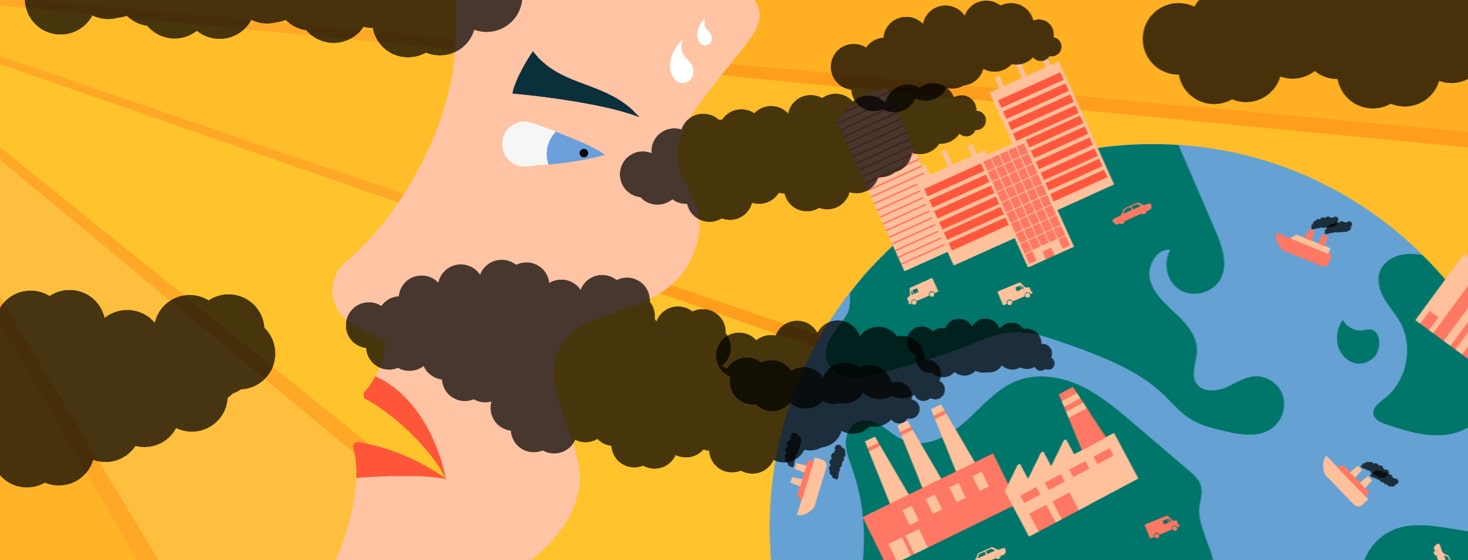Summer Heat, Humidity, and Air Quality as COPD Triggers
Summer is here, and so is the chance to enjoy the great outdoors. But be careful. If you have chronic obstructive pulmonary disease (COPD), you may find that certain aspects of summer make your symptoms worse. Before you head outside, learn how poor air quality, humidity, and heat can interact to trigger COPD symptoms. And consider taking some simple steps to protect yourself.1-3
What to know about COPD and air pollution
Air quality determines how much clean air your lungs get from breathing. If you have COPD, your lungs are already working hard to get enough air. If that air is polluted, their job is even harder.
Many things can contribute to air pollution, including:2-4,6,7
- Smog (ozone)
- Tobacco smoke
- Bits of ash and soil dust
- Factory exhaust
- Transportation exhaust from burning gas (cars, trucks, buses, trains, planes)
- Pollen
Tiny particles from these sources enter your airways when you breathe. They irritate the airways’ protective lining, causing swelling and mucus production. With COPD, the airways are already irritated, damaged, and producing mucus. Air pollution makes this worse. One study showed that air pollution even increased the risk of pneumonia for people with COPD.2-4,6-8
What is the Air Quality Index (AQI)?
The AQI is a number that tells the public the air pollution level for the day. You can find the daily AQI in the newspaper, on the TV or radio, and on websites such as Airnow.gov. There are six levels of air quality scores:1,5,9
- 1 to 50 is “green” and means outdoor conditions are great.
- 51 to 100 is “yellow” and means there is some concern.
- 101 to 150 is “orange” and means poor air quality. This level of pollution can harm people with COPD.
- The last three levels, from 151 to 500, are increasingly unhealthy and hazardous. They are “red,” “purple,” and “maroon.” If the AQI is at any of these levels, you should stay inside.
How do humidity and heat affect COPD?
Humidity refers to the number of tiny water droplets that are in the air. Air quality usually gets worse as humidity goes up. Because warmer air can hold more water, high temperatures can often make humidity go up. This interaction can make your lungs have to work harder for a few reasons:1,3,10,11
The water droplets in humid air trap particles from unclean air. The more droplets there are, the more particles and the more pollutants there are.
Moist air can also make your airways produce more mucus, so you cough more. Moist air has less oxygen, which can cause you to breathe harder.
Warm, moist air makes your body work hard to stay cool. This uses up the energy that your body needs to cope with COPD.
For people with COPD, the most comfortable humidity is between 40 percent and 60 percent. Humidity changes from morning to night. You can check your city’s humidity during the day on the TV or radio or on a weather website.1,3
Protect yourself on days with low AQI and high humidity
If you have COPD, you will want to protect yourself on “orange” days. It is especially important on orange days that are also humid. Check the AQI every day, then make your plans with the following suggestions in mind.1,5
- Avoid strenuous outdoor activities and exercise. These can make you breathe harder and faster, which is hard with COPD.
- Wear loose, light-colored clothes outdoors. These absorb less heat and help keep you cool.
- Stay inside during the hottest part of the day (11:00 AM to 3:00 PM).
- If you are hot outside, go inside somewhere with good-quality, air-conditioned air. This means air without tobacco smoke or strong scents.
- Close your windows, curtains, and blinds to keep your house cool.
- Learn the signs of heat cramps, heat exhaustion, and heat stroke.
- Stay hydrated. Try to drink 16 ounces of water for each active hour in the heat.
- Keep your medicine with you.
How to make the most of the season
Don’t let these concerns discourage you. You can use these facts to help you handle whatever summer has to offer. And despite the heat, humidity, and air quality, summer can still be an enjoyable time of year.
You can enjoy a warm, sunny day indoors or outdoors. Outside, consider taking a walk in the morning or evening when it is less hot. Inside, spread a blanket on the floor and have a picnic in your living room. Or spend some time at the mall, the public library, or a recreation center.
When you learn to handle summer’s COPD challenges, you can enjoy the season to its fullest.
This or That
Does air quality affect your COPD?

Join the conversation